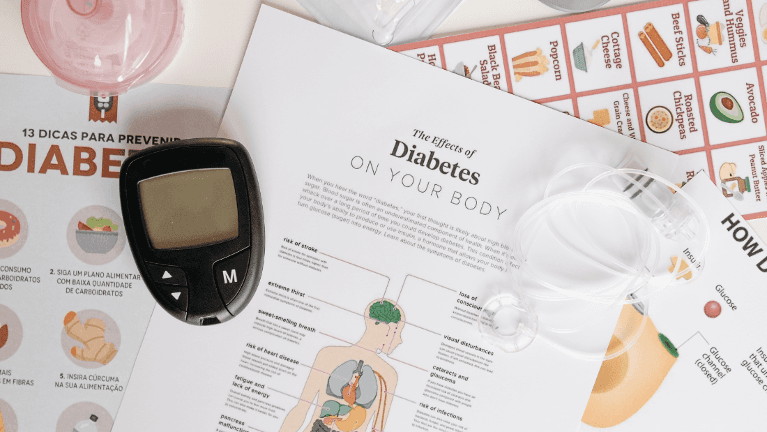
Due to the increased blood glucose levels that go hand in hand with diabetes, you have a higher risk of oral health issues. Problems like cavities, infections, and gum disease should be considered urgent by diabetic patients and their dentists.
Because of the increased risk of dental diseases, you must pay very close attention to the overall health of your mouth. People with high blood sugar are more likely to develop severe oral diseases or lose teeth, so being aware of your mouth is a vital part of being a healthy diabetic patient.
Understanding The Impact of Diabetes on Oral Health
Diabetes and oral health are closely linked. Diabetes weakens the white blood cells responsible for protecting the body from bacteria. When these cells are weakened by high blood sugar, you are more likely to develop oral diseases such as gingivitis and periodontal disease.
Another reason for the increased risk of gum disease is elevated glucose in saliva. The bacteria in plaque feed on glucose, which leads to an increased chance of tooth decay and cavities due to the uncontrolled growth of the plaque-forming bacteria.
Additionally, diabetes causes a weakened immune system, which makes it even more challenging to fight off infections in the mouth. A weakened immune system also affects the rate at which you heal, giving infections more time to spread.
Some diabetes medications can cause dry mouth, which means there is less saliva to remove food and bacteria. The increased bacteria and food particles in the mouth increase the risk of cavities and tooth decay.
What Are the Most Common Health Problems Associated with Diabetes?
Diabetes and the raised blood glucose levels it causes can lead to numerous dental health issues. The most common oral problems diabetic people are at risk for include:
- Abscesses on the gums
- Fungal infections (thrush)
- Ulcers
- Dry mouth
- Chronic bad breath (halitosis)
- Constant unpleasant taste in the mouth
- Problems swallowing and chewing
- Trouble speaking
- Bleeding gums
- Sensitive gums
- Loose teeth
- Receding gums
- Wounds in the mouth that won’t heal
- Frequent cavities
If you have diabetes and experience any of these issues, visit a dentist as soon as possible. Leaving these problems untreated can lead to severe gum diseases, teeth that need to be pulled, and even bone damage in your jaw.
Many of these oral concerns can be treated with medication or proper hygiene. However, some can develop quickly and must be tackled using a combination of dental treatments and powerful medicines. The best approach to keeping these diseases at bay is to regularly visit your dentist and ensure that your sugar levels are carefully controlled.
As Someone with Diabetes, How Can You Protect Your Oral Health?
While the risks presented by diabetes are serious, there are many things you can do to protect yourself. The first and most important thing is to maintain exceptional oral hygiene. This includes:
- Brush your teeth after every meal
- Use tooth floss at least once a day
- Clean your tongue daily
- Use a soft toothbrush to avoid damaging your gums
- Visit your dentist at least twice a year
- Avoid sugary snacks and drinks
- Eat vitamin and fiber-rich foods daily
- Carefully monitor and control your blood glucose levels
- If you smoke, explore ways to quit as soon as possible
In addition to these lifestyle changes, you should speak to your dentist about your diabetes, so they know about your increased risk of oral health issues. Give your dentist a list of the medications you take so they can avoid prescribing anything that might interfere. Share your doctor’s information with your dentist if they have any questions or concerns.
To manage your health holistically, it is also recommended to incorporate stress relief practices such as meditation, yoga, or breathing exercises into your daily routine. High stress levels can interfere with glucose management. Adding exercise to your routine can also help to control your blood sugar.
Lastly, be aware of any changes in your oral health. If any part of your mouth seems painful, swollen, or dry, immediately alert your doctor and dentist before anything becomes too severe.
Collaborating With Your Dentist to Manage Your Condition and Prevent Complications
Working closely with trusted medical professionals can ensure a proactive approach to your health. Regular dentist visits ensure any potential infections are caught before they progress too far. Early detection of gum disease and expeditious cavity repairs can improve blood glucose control, minimizing the risk of severe gum disease.
Speak to your dentist to plan a treatment schedule to monitor your oral health closely. You can ask your doctor and dentist to share your medical records, so both know of any changes to your condition.
While it may be embarrassing to admit that you’ve neglected your dental hygiene, it is vital to speak honestly to your dentist. Your dentist is responsible for helping you care for your mouth, and working together as a team will make the process easier.
To make your dental care journey easier, you should:
- Find a dentist that understands how to work with diabetic patients.
- Ask questions after your appointments. Understanding the condition of your mouth allows you to be proactive in caring for any issues.
- Ask if they noticed any unusual bleeding or inflammation so you know which areas to focus on.
By maintaining an honest relationship with your dentist, you will be an active part of a team whose goal is your mouth's optimal health.
Take Charge of Your Oral Health
Diabetes and oral health are inextricably linked, but you are not powerless. While you face an increased risk of dental issues, you can prevent gum disease, tooth decay, and infections by maintaining excellent oral hygiene and controlling your blood sugar levels.
By working closely with your dentist and taking a proactive approach to your dental health, you can effectively prevent the potential complications of diabetes.